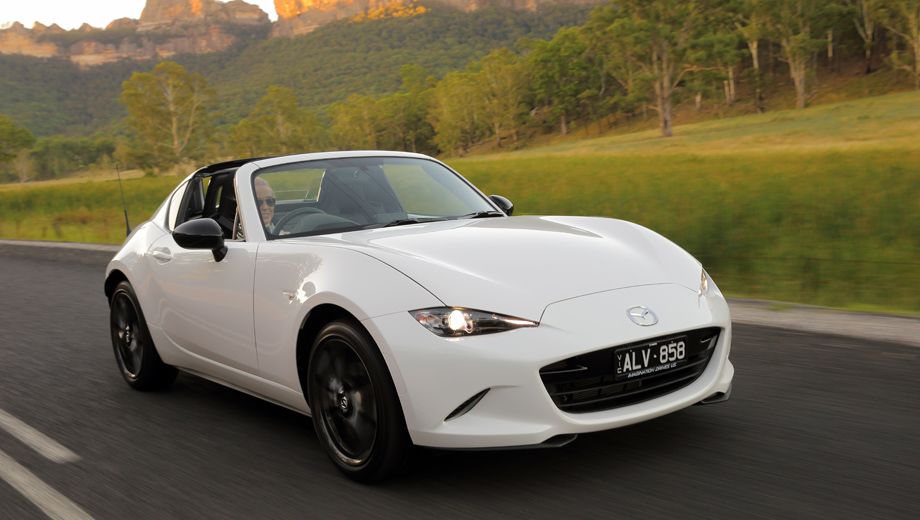The robot drivers are coming.
Virtually every brand in the auto industry is bragging about its autonomous driving capabilities. In four years, some Fords will even skip the steering wheel entirely. But at least two big names aren’t jumping on the bandwagon just yet.
When it comes to “the future of transportation,” Mazda and Porsche got the memo – they just decided to go another way.
Mazda, for one, is sticking to its mantra: “Driving Matters” and doubling down on transmissions tied to stick shifts.
Porsche, meanwhile, sold more than 15,000 two-door sports cars in the U.S. last year, 28 percent of its transactions. Its storied 911 model now comes in 21 configurations, from the base “Carrera” to the nervy new GT3 shown at the New York auto show last week.
We sat down with the North American CEOs for both brands – Mazda’s Masahiro Moro and Porsche’s Klaus Zellmer – to figure out where robots fit in at companies built on steering, speed, and passion. We spoke with Moro first.
Q: Mazda is so focused on driving and racing, how is the company thinking about autonomy?
Moro: It’s a key technology for all manufacturers and Mazda agrees it’s going to be very important. We have full-scale autonomy in development right now. But how we apply this technology will be a little unique. We believe driving pleasure should never die. And we’re selling our products to a core customer who loves driving.
We’ll always take a human-centric approach. The driver will have control and we’ll try to improve peace of mind. If anything happens to the driver, the system will override immediately to bring the car to a safe place.
Q: So, the system is in the background?
Yes. Mazda’s vision of autonomous driving is not bringing you from A to B while you are reading. That’s not Mazda’s way.
Q: Never?
Never.
Q: And you can make that decision because Mazda isn’t a large player?
Right. Mazda is targeting a very small niche of customers. These people really like driving and, to them, a car isn’t a commodity; it’s an emotional expression of their style.
Many customers don’t care too much about driving itself—that’s fine. We focus on a particular type of customer. Our share is two percent; it’s very small.
Q: You’re happy at two percent?
Yes, but I want to achieve a quality two percent, not just two percent. By that I mean, selling the top trims more often, higher brand loyalty, lifelong fans, and a sustainable dealer network.
Later, we spoke with Porsche’s Zellmer.
Q: Porsche doesn’t talk much about autonomy, is that becoming more of a conversation in the Stuttgart headquarters?
Zellmer: Yes. Two years ago, if you raised the question in a town hall environment: “Who thinks Porsche should go into autonomous driving?” Amongst 300 people, you probably saw two raise their hands. It’s much more now.
But if you think about it, autonomous driving started decades ago with cruise control, adaptive cruise control, with lane-keeping assist.
Of course, we’ll have an autonomous drive mode in all of our cars. You will be able to press that button and the car will take you home, because our customers also experience traffic situations they don’t enjoy and they want to do something else.
That does not conflict with grabbing the steering wheel and doing the manual shifting. You have to let the customers choose. We’ll deliver customers the possibility of autonomous driving mode.
Q: So it’s not something you need to talk about overtly? It’s just a feature like cruise control?
Yes, like stability management, like brake assist – that’s exactly it.
Q: Autonomy is not at odds with your talk of driving experience?
It’s not, as long as a driver can do both.
Q: Is it surprising that so many car executives talk about autonomy, as if it’s some kind of Holy Grail?
The fact that so many people talk about it shows that it’s not an issue the car industry can solve on its own.
If you look at farming, tractors have had autonomous driving for years. You push a button and the tractor does the deal and you can lie in your sunbed.
But there’s no oncoming traffic, there are no pedestrians, there’s nothing else. It’s more the environment we live in that’s a challenge.
Q: What’s the right size for Porsche? Is there a volume at which the brand becomes a little less special?
That’s a question we discuss internally and we do so exactly how you put it. If you imagine a supermarket parking lot with 1,000 vehicles. Right now, three of those are Porsches.
Are we still something special? Are we still exclusive? Yes. It’s more the way you handle growth than defining a number that we shouldn’t exceed.
Look at the new Macan (SUV), which adds a lot of volume to our business model. At the same time, we introduced the 918 Spyder (sports car).
If you look at your business as a pyramid and you add something to widen the bottom, you have to make sure that you stay in that top-notch corner as well with something that helps people understand that this brand is still, technologically speaking, the best.
And the 918 Spyder sort of counterweights increasing that footprint. Porsche is not looking for volume; Porsche is looking for fans.

05 Mar 2012
Total posts 26
All good and well, until driving manually is banned on the basis it's far less safe compared to autonomous driving, 95% of accidents being caused by human error
Emirates Airlines - Skywards
30 Nov 2015
Total posts 729
Don't think I will ever buy a car without a steering wheel.
QFF
19 Sep 2013
Total posts 209
Anybody who thinks it will be ok to put their lives in the hands of car software designers should first read the Toyota throttle issue software review report.
Hi Guest, join in the discussion on Will autonomous driving kill the sports car?